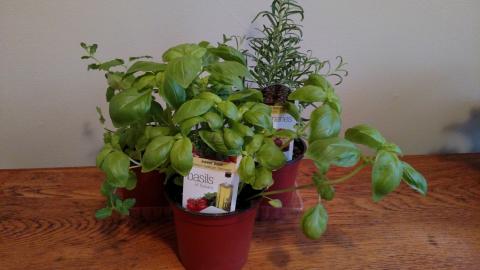How Can I Keep Potted Herbs From the Supermarket Alive Longer?

Throughout the year, it’s not uncommon to find potted herbs for sale at the supermarket. These often draw the attention of those who enjoy cooking with fresh culinary herbs, myself included. Anyone who has purchased a live basil plant in the produce department has probably experienced the disappointment of their plant failing after just a few short weeks. Hopes of having fresh basil on hand for many weeks or months quickly evaporate. So what went wrong? It may seem to make sense to purchase live plants since fresh herbs are expensive and must be used within a few days. The catch is that most herbs have specific growing requirements which may necessitate special care.
How To Water Your Potted Herbs
Overwatering is undoubtedly the number one reason most herbs don’t last long. When potting soil remains saturated for extended periods of time, plants begin to suffer. Leaves may begin to yellow and drop, or the entire plant may wilt. Although wilting is often regarded as a drought indicator, it can also be a symptom of root damage from excess soil water. Thus, it is essential to feel the soil with your fingers for dampness before watering and only watering when the top inch of soil is dry. And, don’t forget about proper drainage. Water should be allowed to flow freely from the bottom of pots, and herbs should never be left sitting in standing water for long. If plants come sleeved in plastic, remove it before watering, and if saucers are used beneath plants to collect drips, empty them quickly.
Humidity Requirements For Your Potted Herbs
Herbs also require a fair amount of humidity in order to thrive, something that most homes lack in the winter months. A humid environment can be created with a humidifier, by spraying plants periodically with a misting bottle, or by filling a pan with moist pebbles and placing the herb container on top, making sure that the bottom of the pot is not submerged in water. Grouping plants close together will also increase humidity, but it can limit air circulation and encourage disease development. A fan placed nearby can mitigate this issue.
Providing Proper Light For Your Potted Herbs
Light is also incredibly important, because most herbs need a minimum of six hours of direct sunlight a day. An unobstructed south facing window may provide enough light, but if you don’t have one of those, consider purchasing a full spectrum grow light and placing your plants beneath it for 14 to 16 hours a day. You’ll know if your herbs aren’t getting enough light if their stems become thin and spindly. Basil, parsley, cilantro, chives, and oregano require a high amount of direct light to grow properly, while mint, bay, and rosemary can handle indirect light.
Minimum Temperature Needs For Your Potted Herbs
Most herbs need a warmth in order to grow. Keep them in rooms that are at least 65-75°F during the day, and no less than 55-60°F at night. Even though many herbs can survive at lower temperatures, they are unlikely to produce much growth under those conditions. Some tender herbs will fail entirely if they are exposed to temperatures lower than 50°F for an extended period of time, such as basil.
How Far Apart To Space Your Potted Herbs
In addition, supermarket herbs are often planted too densely. A small pot that is only large enough to support one healthy herb may be packed with a dozen or more. Though this may give the pot a nice full look when purchased, this is not a recipe for long-term success. If you hope to keep your herbs growing throughout the winter, you’ll either need to thin the plants or divide and transplant them into separate containers. Thinning the plants can become a part of harvesting. Avoid disturbing the roots of other plants by snipping stems at the base with scissors. Once you’re down to only a couple of individual plants, harvest herbs only when they reach a height of six inches and remove no more than a third of the plant at a time.
Growing herbs indoors is not without challenges, but it can be rewarding to have fresh herbs available year-round. Once the danger of frost has passed in the spring, herbs can be planted outside in the garden or moved into larger containers.
Got questions? The Ask UNH Extension Infoline offers practical help finding answers for your home, yard, and garden questions. Call toll free at 1-877-398-4769, Monday to Friday, 9 a.m. to 2 p.m., or e-mail us at answers@unh.edu.
Do you love learning about stuff like this?
SUBSCRIBE TO Granite State Gardening newsletter
Got questions? The UNH Extension Yard and Garden Infoline offers practical help finding answers for your yard and garden questions.
Call toll free at 1-877-398-4769, Monday to Friday, 9 a.m. to 2 p.m., or fill out webform.
